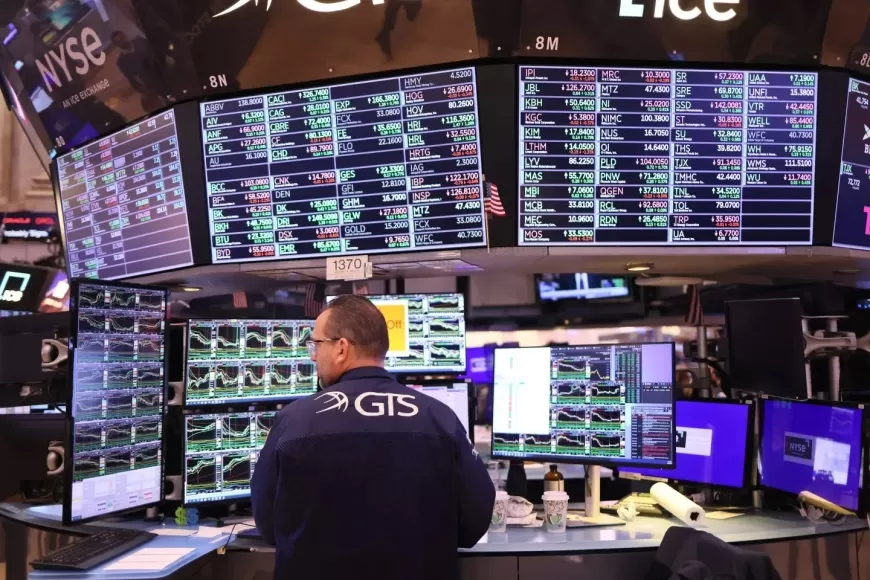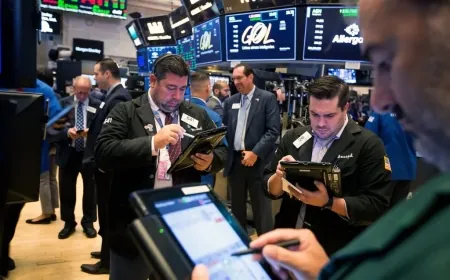US Markets Slip as Middle East Tensions Heighten: Market Update
Rising geopolitical tensions between Israel and Iran are making investors nervous, affecting the US and global markets

US futures took a hit as escalating conflict in the Middle East caused uncertainty in financial markets. With Israel expected to respond to a missile attack from Iran, investors are stepping back from riskier bets. Meanwhile, oil prices have surged as Brent crude nears $76 a barrel, making traders cautious as they await further developments.
Market Reaction to Middle East Crisis
The S&P 500 futures dropped by 0.2%, while European stocks also lost earlier gains. Investors are leaning towards safer assets like US Treasuries, pushing the yield on 10-year bonds up to 3.78%, after hitting a low of 3.69% earlier. Despite the turmoil, the US dollar remained steady.
Analysts note that the markets are anxious but still holding onto hope that the situation won’t escalate into a full-blown war. Anna Rosenberg, head of geopolitics at Amundi Asset Management, mentioned that while the uncertainty is real, many still expect the situation to remain contained. Wall Street's fear gauge, known as the VIX, has hit a key level, signaling that more volatility may lie ahead.
Oil Prices Spike as Investors Fear Supply Disruptions
Oil prices saw a sharp rise as the Middle East tensions led to worries about possible disruptions in oil supply. West Texas Intermediate crude went up 3.1%, reaching $71.97 per barrel. Any potential escalation could send oil prices even higher, as the region plays a crucial role in global energy markets.
According to Wei Li, chief investment strategist at BlackRock, the focus of investors has shifted from inflation concerns to how the latest Middle East conflict might affect the energy market. “Energy markets are extremely sensitive to these geopolitical developments,” Li said.
Eyes on US Job Market Amid Global Uncertainty
While geopolitical tensions dominate the headlines, investors are also keeping an eye on upcoming US economic data. The nonfarm payrolls report, due this Friday, will give insight into the health of the labor market. Although recent data showed more jobs were added than expected in September, there are still signs that hiring may be slowing down.
In corporate news, JD Sports Fashion Plc saw a decline after releasing its earnings report. Meanwhile, Nike Inc. experienced a sharp drop of more than 5% in premarket trading following a decrease in quarterly sales.
Global Markets React
In Europe, France is planning to implement €60 billion ($66.4 billion) in spending cuts and tax increases next year in an effort to shrink its budget deficit. This move caused the spread between French and German bonds to narrow slightly after the details were made public, though it remains close to its highest point in over a decade.
In Asia, the Japanese yen weakened after comments from Prime Minister Shigeru Ishiba suggested that the Bank of Japan would not make any more interest rate changes for the time being. The yen dropped 1.1%, reaching 145.09 per dollar, marking its lowest level since late September.
Chinese stocks surged in Hong Kong, with the biggest rally in almost two years, after Beijing relaxed home-buying rules in major cities. These measures are part of China’s efforts to boost its economy, which also helped lift other global markets.
Key Events to Watch This Week
-
US nonfarm payrolls report (Friday)
-
S&P Global Manufacturing PMI
-
Federal Reserve speakers, including Richmond’s Thomas Barkin and Michelle Bowman
Market Summary
Stocks:
-
S&P 500 futures: -0.2%
-
Nasdaq 100 futures: Flat
-
Dow Jones futures: -0.2%
-
Stoxx Europe 600: -0.2%
-
MSCI World Index: -0.2%
Currencies:
-
US Dollar Index: Steady
-
Euro: $1.1066
-
British Pound: $1.3289
-
Japanese Yen: 145.09 per dollar (-1.1%)
Cryptocurrencies:
-
Bitcoin: $61,048.82 (+0.4%)
-
Ether: $2,453.46 (Unchanged)
Bonds:
-
US 10-year Treasury yield: 3.78% (+5 basis points)
-
Germany’s 10-year yield: 2.10% (+6 basis points)
-
UK 10-year yield: 4.03% (+9 basis points)
Commodities:
-
West Texas Intermediate crude: $71.97 per barrel (+3.1%)
-
Spot gold: $2,648.76 (-0.5%)
What’s Next for the Markets?
As the conflict between Israel and Iran continues to unfold, markets are expected to remain volatile. Investors will be keeping a close eye on both the geopolitical situation and upcoming economic data, particularly the US jobs report, which could provide more clarity on the state of the economy.
Also Read: Stocks Edge Lower as Investors Eye Key Jobs and Manufacturing Data































































